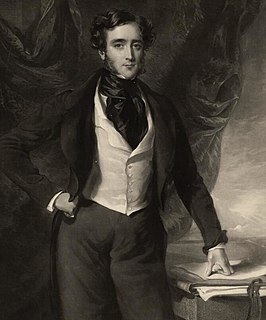
Viscount Cobham is a title in the Peerage of Great Britain that was created in 1718. Owing to its special remainder, the title has passed through several families. Since 1889, it has been held by members of the Lyttelton family.

Earl of Scarbrough is a title in the Peerage of England. It was created in 1690 for Richard Lumley, 2nd Viscount Lumley. He is best remembered as one of the Immortal Seven who invited William of Orange to invade England and depose his father-in-law James II. Lumley had already been created Baron Lumley, of Lumley Castle in the County of Durham, in 1681, and Viscount Lumley, of Lumley Castle in the County of Durham, in 1689. These titles are also in the Peerage of England. The title of Viscount Lumley, of Waterford, was created in the Peerage of Ireland in 1628 for his grandfather Sir Richard Lumley, who later fought as a Royalist in the Civil War.

Baron Milford is a title that has been created three times, once in the Peerage of Ireland and twice in the Peerage of the United Kingdom. All three creations have been for members of the same family. The first creation came in the Peerage of Ireland in 1776 when Sir Richard Philipps, 7th Baronet, of Picton Castle was made Baron Milford. However, this title became extinct on his death in 1823, while the baronetcy was passed on to a distant relative. The title was revived in the Peerage of the United Kingdom in 1847 when Sir Richard Philipps, 1st Baronet, of Picton Castle was created Baron Milford, of Picton Castle in the County of Pembroke. Born Richard Bulkeley Philipps Grant, he was the son of John Grant and Mary Philippa Artemisia, daughter of James Child and Mary Philippa Artemisia, daughter of Bulkeley Philipps, uncle of the first Baron of the first creation. He succeeded to the Philipps estates in 1823 and assumed the surname of Philipps the same year. In 1828 he was created a Baronet, of Picton Castle in the County of Pembroke, in the Baronetage of the United Kingdom. However, Lord Milford was childless and the titles became extinct on his death in 1857. He devised his estates to his half-brother Reverend James Henry Alexander Gwyther, who assumed the surname of Philipps. James's daughter Mary Philippa married Charles Edward Gregg Fisher, who assumed the surname of Philipps and was created a Baronet, of Picton, in 1887.
Sir Richard Bulkeley of Beaumaris, Anglesey and Lewisham was a Welsh politician who sat in the House of Commons of England in 1563 and from 1604 to 1614.
Thomas Bulkeley, 1st Viscount Bulkeley (1585–1659) was a landowner from North Wales who supported the Royalist cause during the English Civil War.
The Williams, later Williams-Bulkeley Baronetcy, of Penrhyn in the County of Caernarvon, is a title in the Baronetage of England. It was created on 17 June 1661 for Griffith Williams. He had already been granted a baronetcy by Oliver Cromwell in 1658. The second Baronet represented both Caernarvonshire and Caernarvon in the House of Commons. The eighth Baronet sat as Member of Parliament for Beaumaris while the ninth Baronet represented Caernarvonshire and Beaumaris. The tenth Baronet was Member of Parliament for Beaumaris, Anglesey and Flint Burghs and served as Lord Lieutenant of Caernarvonshire. In 1826 he assumed by Royal licence the additional surname of Bulkeley on succeeding to the estates of Thomas James Bulkeley, 7th Viscount Bulkeley. The twelfth and thirteenth Baronets were both Lord Lieutenant of Anglesey while the latter was also Lord Lieutenant of Gwynedd. The family seat is Baron Hill, Anglesey. Arms of Williams of Penrhyn: Gules, a chevron ermine between three Saxon's heads in profile couped proper.
This article is about the particular significance of the year 1800 to Wales and its people.

Thomas James Bulkeley, 7th Viscount Bulkeley, later Warren-Bulkeley, was a Welsh aristocrat and politician who sat in the House of Commons from 1774 to 1784 when he was raised to the peerage.
Richard Bulkeley may refer to:
Bulkeley or Bulkley is a surname. Notable persons with that surname include:
Events from the year 1752 in Wales.
Robert Bulkeley, 2nd Viscount Bulkeley of Cashel was a British peer and politician.

Sir Richard Bulkeley Williams-Bulkeley, 10th baronet was an English Whig and Liberal Party politician who sat in the House of Commons variously between 1831 and 1868.
Thomas Bulkeley may refer to:
Richard Bulkeley, 3rd Viscount Bulkeley was a Welsh politician and peer.
Richard Bulkeley, 4th Viscount Bulkeley, of Baron Hill, Anglesey, was a Welsh Tory politician who sat in the House of Commons between 1704 and 1724. He was extremely hot-tempered and was involved in several personal and family disputes with local Whig leaders.
Richard Bulkeley, 5th Viscount Bulkeley of Baron Hill, Anglesey was a Welsh landowner and Tory politician who sat in the House of Commons from 1730 to 1738.
James Bulkeley, 6th Viscount Bulkeley of Baron Hill, Anglesey, was a Welsh landowner and Tory politician who sat in the House of Commons from 1739 to 1752.
Sir Hugh Williams, 8th Baronet, was a British soldier and politician who sat in the House of Commons between 1768 and 1794.





